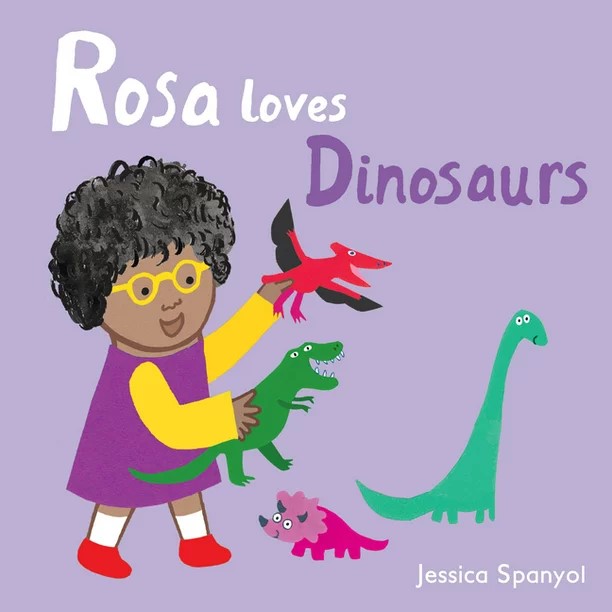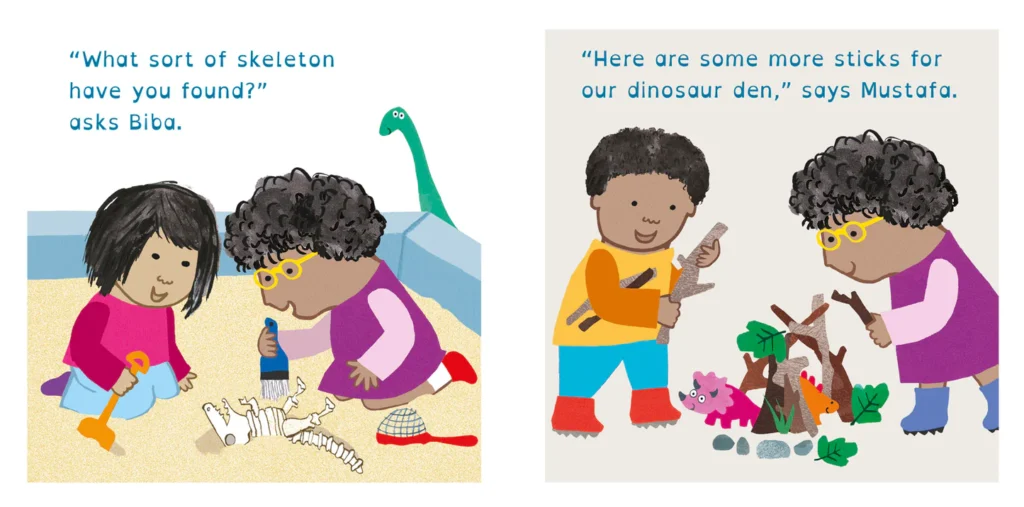
Inclusive Children's Book Teaching Guide
Rosa Loves Dinosaurs
What is this book about?
Each book in the Rosa series features a young girl exploring a unique topic, conducting an investigation, or playing with a toy of interest with her friends. This important series celebrates inclusivity, promotes gender equality, and embraces the uniqueness of every child.
In Rosa Loves Dinosaurs, Rosa has a busy day playing with her dinosaurs and her friends. Several dinosaurs are referred to by their species as Rosa takes them on pretend adventures, engages in a dinosaur battle, builds a dinosaur den, uncovers a fossil in her sandbox, looks up dinosaur facts, feeds them, and bathes them.
Other books in the series include Rosa Loves Cars, Rosa Rides Her Scooter, and Rosa Plays Ball. Spanyol's Clive series—which includes Clive and His Babies, Clive is a Nurse, and other titles—also celebrates diversity and challenges gender stereotypes.
Who is depicted in this book?
- Children who transcend gender stereotypes
What early childhood themes and concepts does this book explore?
- Types, features and behaviors of dinosaurs
- The many ways that children can engage with and learn about dinosaurs
How does this book support anti-bias education?
This book depicts Rosa as aware of her preferences for play and shows her confidence in and comfort with sharing facts about dinosaurs and engaging in a variety of pretend-play scenarios with her friends. Rosa’s play and toy choices represent a range of activities that transcend gender stereotypes. She shows leadership and scientific thinking while engaging in active play.
Depending on how the book is shared or used—and the developmental levels of the children—Rosa Loves Dinosaurs may be used to support the following core goal from Anti-Bias Education for Young Children and Ourselves:
Identity—Teachers will nurture each child’s construction of knowledgeable and confident personal and social identities so that children will demonstrate self-awareness, confidence, family pride, and positive social identities.
How can this book be used to meet early childhood learning standards?
For all ages
Use Rosa Loves Dinosaurs to meet early childhood literacy standards
For children from birth to age three
Teaching suggestion: Imitate the various actions and sounds that are a part of Rosa’s dinosaur play while looking through the book. This can be done by imitating actions from the book (with or without dinosaur toys as props).
What Illinois Early Learning Guideline does this meet for children from birth to age three?
Developmental DomainCognitive Development
Standard: Science Concepts and ExplorationChildren demonstrate a basic awareness of and use scientific concepts.
Indicators for children:
- Asks simple questions about nature (16–24 months)
- Uses motion and sound to represent and observation, such as: “Snake, ssss!” (16–24 months)
- Begins to identify characteristics of animals (21–36 months)
Teaching suggestion: Point out and name the many types of dinosaurs that Rosa plays with. Refer to the category (dinosaur) and the species (triceratops) as you play.
What Illinois Early Learning Guideline does this meet for children from birth to age three?
Developmental DomainLanguage Development, Communication and Literacy
Standard: Early LiteracyChildren demonstrate interest in and comprehension of printed materials.
Indicators for children:
- Imitates gestures and sounds during activities (7–18 months)
- Repeats familiar words in a book while being read to (16–24 months)
For preschoolers (ages three to five)
Teaching suggestion: Rosa plays with her dinosaurs in a variety of ways and acts out many different activities. Encourage the children to react to and talk about the different activities that they see in the book and then plan which ones they will act out in the animal/block area. Teachers can also incorporate toy dinosaurs into the book share.
What Illinois Early Learning and Development Standards does this meet for preschoolers?
The Arts Standard25AInvestigate, begin to appreciate, and participate in the arts.
Benchmark 25.A.ECb:
Drama: Begin to appreciate and participate in dramatic activities.
Teaching suggestion: Discuss the various similarities and differences among the dinosaurs that Rosa plays with. Ask: "Where do they live? What do they need and eat? Do they grow and change?"
What Illinois Early Learning and Development Standards does this meet for preschoolers?
Science Standard12AUnderstand that living things grow and change.
Benchmark 12.A.ECa:
Observe, investigate, describe, and categorize living things.
What Illinois Early Learning and Development Standards does this meet for preschoolers?
Science Standard12BUnderstand that living things rely on the environment and/or others to live and grow.
Benchmark 12.B.ECa:
Describe and compare basic needs of living things.
See inside this book.

